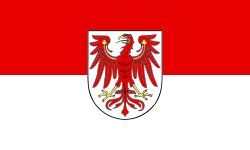Brandenburg state election, 2009
Brandenburg state election, 2009

|
|
|
|
| All 88 seats of the Landtag of Brandenburg |
| |
First party |
Second party |
Third party |
| |
|
|
|
| Leader |
Matthias Platzeck |
Kerstin Kaiser |
Johanna Wanka |
| Party |
SPD |
Left |
CDU |
| Last election |
33 seats, 31.9% |
29 seats, 28.0%[1] |
20 seats, 19.4% |
| Seats won |
31 |
26 |
19 |
| Seat change |
-2 |
-3 |
-1 |
| Percentage |
33.0% |
27.2% |
19.8% |
|
| |
Fourth party |
Fifth party |
Sixth party |
| |
|
|
|
| Leader |
Hans-Peter Goetz |
Marie Luise von Halem and Axel Vogel |
|
| Party |
FDP |
Green |
DVU |
| Last election |
0 seats, 3.3% |
0 seats, 3.6% |
6 seats |
| Seats won |
7 |
5 |
0 |
| Seat change |
+7 |
+5 |
-6 |
| Percentage |
7.2% |
5.6% |
|
|
|
State elections were held in Brandenburg on 27 September 2009, the same day as the German federal elections and the Schleswig-Holstein state elections. The elections determined control of the Landtag of Brandenburg (Brandenburg's legislature).
Entering the election, the Social Democratic Party (SPD) and Christian Democratic Union (CDU) governed together in a grand coalition headed by Minister-President Matthias Platzeck (SPD).
Platzeck once again ran as the top candidate for the SPD. The top candidate of the Left Party was the leader of the party's faction in the Landtag, Kerstin Kaiser, while the CDU's top candidate was Johanna Wanka, the current Minister for Science, Research, and Culture in Brandenburg's government. The far-right German People's Union (DVU) nominated faction leader Liane Hesselbarth as its top candidate, while the campaign of the Green Party was led by both Marie Luise von Halem and Axel Vogel. The Free Democratic Party (FDP), meanwhile, nominated Hans-Peter Goetz, a Teltow lawyer, as its top candidate.
Results
The SPD once again came in first in the election, gaining a slightly larger share of the vote than in 2004 but losing two seats. The vote totals for the second-place Left Party and third-place CDU were largely unchanged from the last election, with a slight drop in support for the Left and a marginal gain for the CDU. Both the FDP and the Greens passed the 5% hurdle for representation, thus gaining seats in the Landtag for the first time since the 1990 election. In contrast, the far-right DVU saw its share of the vote collapse to just 1.2% and is no longer represented in the Landtag.
After the election, the SPD and The Left formed a "red-red" coalition, allowing Matthias Platzeck to continue as Minister-President.[2]
Notes